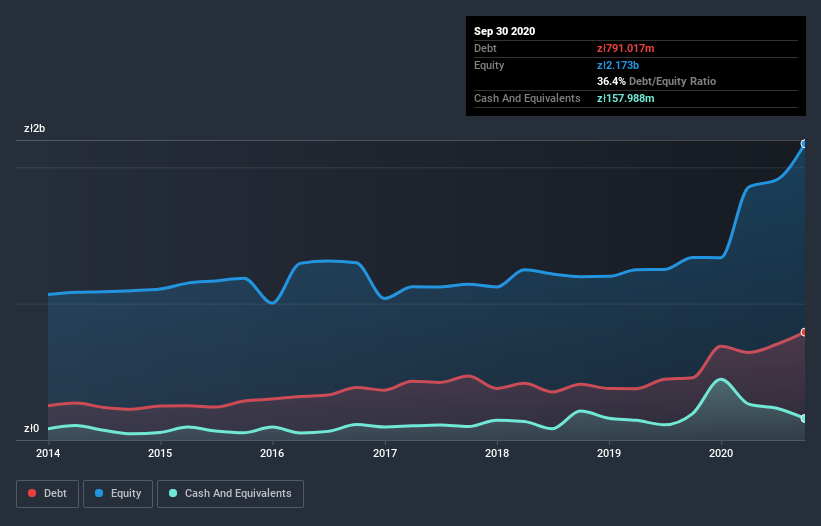Does Grupa Azoty Zaklady Chemiczne Police (WSE:PCE) Have A Healthy Balance Sheet?

Howard Marks put it nicely when he said that, rather than worrying about share price volatility, 'The possibility of permanent loss is the risk I worry about... and every practical investor I know worries about.' When we think about how risky a company is, we always like to look at its use of debt, since debt overload can lead to ruin. Importantly, Grupa Azoty Zaklady Chemiczne Police S.A. (WSE:PCE) does carry debt. But should shareholders be worried about its use of debt?
When Is Debt Dangerous?
Debt and other liabilities become risky for a business when it cannot easily fulfill those obligations, either with free cash flow or by raising capital at an attractive price. Ultimately, if the company can't fulfill its legal obligations to repay debt, shareholders could walk away with nothing. However, a more frequent (but still costly) occurrence is where a company must issue shares at bargain-basement prices, permanently diluting shareholders, just to shore up its balance sheet. Of course, the upside of debt is that it often represents cheap capital, especially when it replaces dilution in a company with the ability to reinvest at high rates of return. The first thing to do when considering how much debt a business uses is to look at its cash and debt together.
View our latest analysis for Grupa Azoty Zaklady Chemiczne Police
What Is Grupa Azoty Zaklady Chemiczne Police's Debt?
As you can see below, at the end of September 2020, Grupa Azoty Zaklady Chemiczne Police had zł791.0m of debt, up from zł457.1m a year ago. Click the image for more detail. On the flip side, it has zł158.0m in cash leading to net debt of about zł633.0m.

A Look At Grupa Azoty Zaklady Chemiczne Police's Liabilities
According to the last reported balance sheet, Grupa Azoty Zaklady Chemiczne Police had liabilities of zł1.03b due within 12 months, and liabilities of zł998.1m due beyond 12 months. Offsetting these obligations, it had cash of zł158.0m as well as receivables valued at zł270.7m due within 12 months. So its liabilities outweigh the sum of its cash and (near-term) receivables by zł1.60b.
Given this deficit is actually higher than the company's market capitalization of zł1.55b, we think shareholders really should watch Grupa Azoty Zaklady Chemiczne Police's debt levels, like a parent watching their child ride a bike for the first time. In the scenario where the company had to clean up its balance sheet quickly, it seems likely shareholders would suffer extensive dilution.
In order to size up a company's debt relative to its earnings, we calculate its net debt divided by its earnings before interest, tax, depreciation, and amortization (EBITDA) and its earnings before interest and tax (EBIT) divided by its interest expense (its interest cover). The advantage of this approach is that we take into account both the absolute quantum of debt (with net debt to EBITDA) and the actual interest expenses associated with that debt (with its interest cover ratio).
Grupa Azoty Zaklady Chemiczne Police has a debt to EBITDA ratio of 3.7, which signals significant debt, but is still pretty reasonable for most types of business. But its EBIT was about 1k times its interest expense, implying the company isn't really paying a high cost to maintain that level of debt. Even were the low cost to prove unsustainable, that is a good sign. Grupa Azoty Zaklady Chemiczne Police grew its EBIT by 8.3% in the last year. That's far from incredible but it is a good thing, when it comes to paying off debt. When analysing debt levels, the balance sheet is the obvious place to start. But it is Grupa Azoty Zaklady Chemiczne Police's earnings that will influence how the balance sheet holds up in the future. So if you're keen to discover more about its earnings, it might be worth checking out this graph of its long term earnings trend.
But our final consideration is also important, because a company cannot pay debt with paper profits; it needs cold hard cash. So we always check how much of that EBIT is translated into free cash flow. Over the last three years, Grupa Azoty Zaklady Chemiczne Police saw substantial negative free cash flow, in total. While that may be a result of expenditure for growth, it does make the debt far more risky.
Our View
Mulling over Grupa Azoty Zaklady Chemiczne Police's attempt at converting EBIT to free cash flow, we're certainly not enthusiastic. But on the bright side, its interest cover is a good sign, and makes us more optimistic. Overall, we think it's fair to say that Grupa Azoty Zaklady Chemiczne Police has enough debt that there are some real risks around the balance sheet. If everything goes well that may pay off but the downside of this debt is a greater risk of permanent losses. When analysing debt levels, the balance sheet is the obvious place to start. But ultimately, every company can contain risks that exist outside of the balance sheet. To that end, you should be aware of the 3 warning signs we've spotted with Grupa Azoty Zaklady Chemiczne Police .
Of course, if you're the type of investor who prefers buying stocks without the burden of debt, then don't hesitate to discover our exclusive list of net cash growth stocks, today.
If you decide to trade Grupa Azoty Zaklady Chemiczne Police, use the lowest-cost* platform that is rated #1 Overall by Barron’s, Interactive Brokers. Trade stocks, options, futures, forex, bonds and funds on 135 markets, all from a single integrated account. Promoted
New: Manage All Your Stock Portfolios in One Place
We've created the ultimate portfolio companion for stock investors, and it's free.
• Connect an unlimited number of Portfolios and see your total in one currency
• Be alerted to new Warning Signs or Risks via email or mobile
• Track the Fair Value of your stocks
This article by Simply Wall St is general in nature. It does not constitute a recommendation to buy or sell any stock, and does not take account of your objectives, or your financial situation. We aim to bring you long-term focused analysis driven by fundamental data. Note that our analysis may not factor in the latest price-sensitive company announcements or qualitative material. Simply Wall St has no position in any stocks mentioned.
*Interactive Brokers Rated Lowest Cost Broker by StockBrokers.com Annual Online Review 2020
Have feedback on this article? Concerned about the content? Get in touch with us directly. Alternatively, email editorial-team@simplywallst.com.
About WSE:PCE
Grupa Azoty Zaklady Chemiczne Police
Grupa Azoty Zaklady Chemiczne Police S.A.
Good value with mediocre balance sheet.


